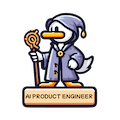🦆 Welcome to QuackChat: The DuckTypers' Daily AI Update!
Hello, DuckTypers! Jens here, ready to discuss about the fascinating world of AI advancements. Today, we're exploring how AI models are evolving to tackle complex tasks in reasoning, coding, and mathematical problem-solving. So, let's roll up our sleeves and get into the nitty-gritty of these developments.
🧠 The Evolution of AI Reasoning: Beyond Simple Tasks

First up, let's talk about a significant development in AI reasoning capabilities. The OpenAI o1 model has been making waves already for some weeks with its claimed ability to handle complex reasoning tasks. However, it's not all smooth sailing.
Recent discussions have highlighted that while o1 shows impressive performance on olympiad-level tasks, it struggles with simpler problems. This raises interesting questions about the nature of AI reasoning and generalization.
Here's a simplified pseudocode to illustrate the challenge:
def ai_reasoning(task):
if task.complexity == "olympiad":
return solve_complex_problem(task)
elif task.complexity == "simple":
return struggle_with_basic_concepts(task)
else:
return "I'm not sure how to approach this task"
def solve_complex_problem(task):
# Impressive performance on difficult tasks
pass
def struggle_with_basic_concepts(task):
# Unexpected difficulties with simple problems
passThis behavior highlights a key challenge in AI development: creating models that can generalize across different levels of complexity.
Question for you, DuckTypers: How do you think we can improve AI models to perform consistently across varying task complexities? Share your thoughts in the comments!
💻 Coding the Future: AI in Software Development

Now, let's switch to something that's close to my heart as a software architect - AI in coding. We've seen some exciting developments in this area, particularly with models like Dracarys 2.
Dracarys 2 is making waves by outperforming other models on coding benchmarks. It's achieving impressive scores on tasks like code editing, showcasing the potential of AI in software development.
Here's a simplified example of how an AI coding assistant might work:
def ai_code_assistant(task, existing_code):
understood_task = analyze_task(task)
code_structure = plan_code_structure(understood_task)
new_code = generate_code(code_structure, existing_code)
return refine_and_optimize(new_code)
def analyze_task(task):
# Understand the requirements
pass
def plan_code_structure(understood_task):
# Create a high-level plan for the code
pass
def generate_code(structure, existing_code):
# Write new code based on the plan and existing code
pass
def refine_and_optimize(code):
# Improve the generated code
passThis example illustrates the complex process involved in AI-assisted coding. It's not just about writing code, but understanding requirements, planning structure, and optimizing output.
Here's a challenge for you, DuckTyppers: How would you improve this AI coding assistant? What additional features or checks would you add? Share your ideas in the comments!
🔢 Crunching Numbers: AI Tackles Mathematical Challenges
Let's move on to another exciting area - AI in mathematical problem-solving. We're seeing models that can handle complex mathematical tasks, from algebra to calculus and beyond.
One interesting development is the use of Chain-of-Thought (CoT) reasoning in mathematical problem-solving. This approach allows AI models to break down complex problems into smaller, more manageable steps.
Here's a simplified pseudocode of how this might work:
def solve_math_problem(problem):
steps = break_down_problem(problem)
solution = ""
for step in steps:
intermediate_result = solve_step(step)
solution += f"Step {step.number}: {intermediate_result}
"
final_answer = derive_final_answer(steps)
return solution + f"Final Answer: {final_answer}"
def break_down_problem(problem):
# Use AI to decompose the problem into logical steps
pass
def solve_step(step):
# Solve individual step of the problem
pass
def derive_final_answer(steps):
# Combine results from all steps to get the final answer
passThis approach mimics how humans solve complex problems, potentially making AI's problem-solving process more interpretable and reliable.
Question for the DuckTypers: How do you think this step-by-step approach to problem-solving could be applied in other areas beyond mathematics? Share your innovative ideas!
🚀 The Bigger Picture: AI's Impact Across Industries
Now, let's zoom out and consider the broader implications of these advancements. The improvements in AI reasoning, coding, and mathematical problem-solving aren't just academic curiosities. They have the potential to transform various industries.
For instance:
- In healthcare, advanced reasoning models could assist in complex diagnoses.
- In finance, AI could tackle intricate mathematical models for risk assessment.
- In software development, AI coding assistants could significantly boost productivity.
Here's a simplified representation of how AI might be integrated into different industries:
def ai_industry_integration(industry, task):
specialized_model = select_model(industry)
task_analysis = specialized_model.analyze(task)
solution = specialized_model.solve(task_analysis)
human_expert = get_human_expert(industry)
return human_expert.validate(solution)
def select_model(industry):
# Choose the most appropriate AI model for the industry
pass
def get_human_expert(industry):
# Involve a human expert for oversight and validation
passThis approach emphasizes the importance of combining AI capabilities with human expertise for optimal results.
Final question for our DuckTypers: How do you envision AI transforming your industry in the next 5-10 years? What challenges and opportunities do you foresee? Share your predictions in the comments!
🎓 Wrapping Up: The Journey Continues
Remember, as AI continues to evolve, so too must our approach to working with it. We need to be critical thinkers, always questioning and always learning.
Let's learn from each other and grow together as a community of AI enthusiasts and developers.
Until next time, this is Jens, signing off from QuackChat: The DuckTypers' Daily AI Update!


